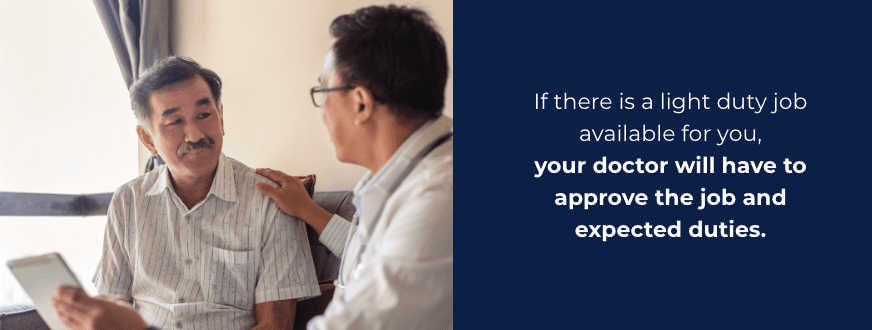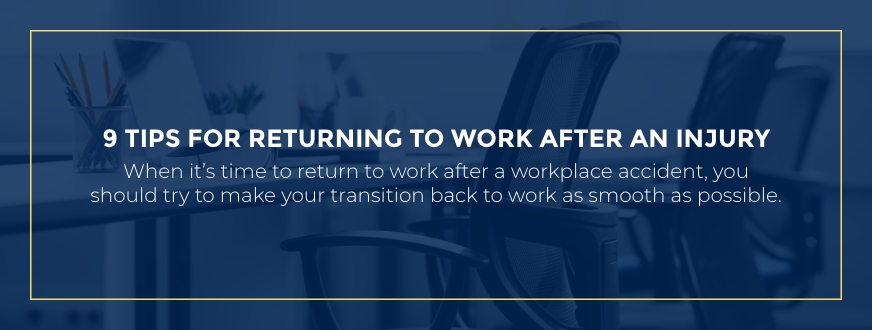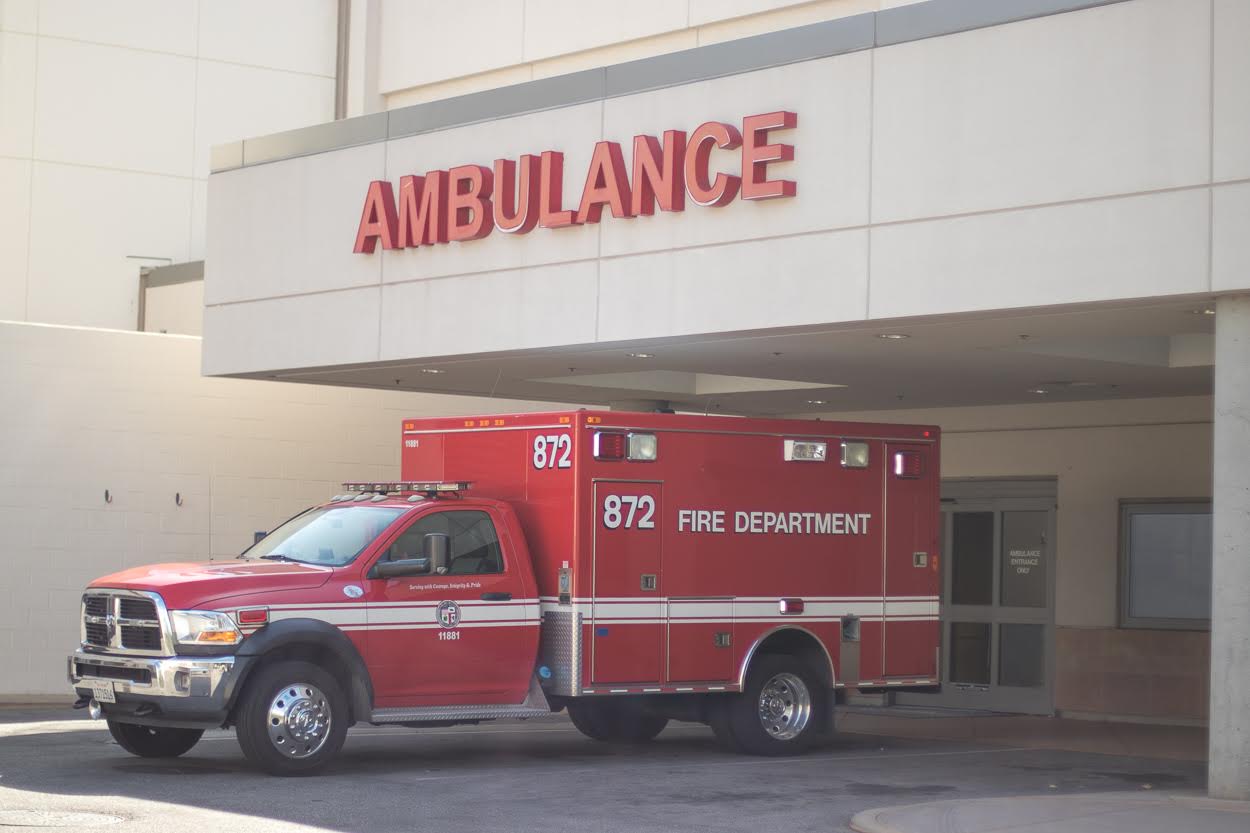If you have been injured at work and have been receiving workers’ compensation benefits, it can be a stressful time. The worker’s compensation process isn’t always easy to negotiate, and there are many rules and regulations to follow. One difficult aspect is when your employer and workers’ compensation doctors believe you are ready to return to work before you do.
Can I Be Forced Back To Work After An Injury?
Perhaps you are still not feeling like you have fully recovered from your injury. Or you think that you need further physical therapy or additional treatment. This crossroads can be a point of contention with your employer, yet you don’t want to jeopardize your employment. What are your options if this happens to you?
If you haven’t already, one of the first things you should do is consult with a workers’ compensation attorney for advice. The attorney will be able to assist you with your case and protect your rights.

Who Decides When You Should Return to Work After an Injury?
When you are recovering from an injury, several factors play into the return to work process. While you will have to communicate with your employer and their insurance company, neither decide when you can return. Your doctor is the only qualified individual who can determine the point at which you can return to your duties. The doctor will perform examinations throughout your recovery process. You might be cleared for a full return or a return with restrictions.
Sometimes, your employer might pressure you to return before your doctor’s clearance. Even though this is not an acceptable practice, your manager or the insurance company might try anyway. Under no circumstance should you feel required to return to work before your doctor’s clearance.
Your doctor might choose to wait until you make a complete recovery to release you. In other cases, they might release you before you finish treatment with some restrictions. These restrictions can include avoiding specific movements or limits on how much weight you can lift. Your employer is required by law to supply most modifications so long as they are reasonable and attainable.
If your doctor clears you for work and you do not feel ready, you are entitled to request a second opinion.
What If I Don’t Agree With My Employer and Workers’ Comp About My Return to Work?
If you, your employer, and workers’ compensation doctors cannot agree on your return to work, you do have some options. Typically, the first thing that will happen is you will be asked to attend an Independent Medical Exam. The exam is performed by a doctor your employer’s insurance company chooses.
Often, the exam results are predictable – they show that you are recovered and can return to work. Typically, the doctor will say that you can resume your regular work duties without restriction. You will then receive documentation that allows you to return to work.
You may disagree with this decision. Here’s what you can do if that is the case:
- Seek a second opinion: If your employer says you can go back to work, and the physician agrees, seek a second opinion. You can see your own doctor, though you will likely have to pay for the exam. If your doctor believes you should not return to work, you can refuse to go back. Your employer may file a petition in disagreement, but you will receive your benefits until a judge hears your case. It’s important that you contact an attorney quickly to help you with your case.
- Negotiate your case: If your employer and doctor say you can return, but you refuse, you will likely lose your workers’ compensation benefits. If this happens, you should enlist the help of an experienced workers’ compensation lawyer to negotiate your case.
In these situations, you should begin working with an attorney immediately. You should also try to maintain a good working relationship with the doctor who is treating you. Ask for documentation detailing your doctor’s recommendations, even if it’s the same as previous appointments. This documentation helps your lawyer proceed with your workers’ compensation case.

When Your Doctor Releases You on Light Duty
There may come a time during your recovery from your workplace injury when your doctor decides that you can return to work but on light duty. That means that you can perform some tasks, but perhaps not all of your current job duties, due to your continuing medical restrictions. If this happens and your employer doesn’t have a light-duty job available, you will continue to receive your workers’ compensation benefits.

If there is a light-duty job available for you, your doctor will have to approve it and the expected duties. In the event that the payment for the light-duty job is less than what you were earning before your injury, you may be eligible for partial benefits.
Once you return to work, workers’ compensation will still pay for any ongoing medical expenses related to your injury. Additionally, your full benefits may be reinstated if:
- You are laid off from your position.
- You are terminated without proper cause.
- Your doctor reevaluates and decides that you should be taken back off work.

Can My Employer Fire Me If I Don’t Return to Work Fast Enough?
Your employer is not legally allowed to fire you over filing a worker’s compensation claim. However, in Pennsylvania and New Jersey, employers can fire or lay off at-will employees for any other reason or no reason at all.
As an example, your boss might choose to terminate you based on poor performance. While this is legal, there can be cause for concern if you are fired within a short period after filing for worker’s compensation. Unfortunately, since the law allows your employer to fire you at any point, you cannot prevent it from happening.
If you suspect your termination was a form of retaliation, you should contact your worker’s compensation attorney. Even if your employer claimed to fire you for another reason, evidence could prove it was retaliation, which is illegal. If you have proof that leads you to believe you have been wrongfully terminated, your attorney can help.
Typical Workers’ Compensation Return to Work Timeline
While not every occupational injury or illness is the same, there are general guidelines you will follow from start to finish. Steps in the return to work process include:
- Work-related injury: The starting point for all return to work processes is when you become injured or ill due to work.
- Diagnosis: You are seen by a doctor, and they make a diagnosis. Doctors screen for work-related injuries, so this will be one of the first steps in affirming your worker’s compensation.
- Employer notification: Your state has guidelines for how quickly you need to report your work-related injury to your employer. In Pennsylvania, you have 120 days, and in New Jersey, you have 90.
- Claim filing: You will need to file a worker’s compensation claim. In Pennsylvania, you have up to three years to file the claim. In New Jersey, you have two years.
- Benefits disbursement: You receive benefits for being out of work due to an injury or illness. These benefits can include payments for medical treatments and wage compensation.
- Additional treatment: You return to the doctor for more treatments for your injury or illness. Your doctor determines how you are progressing and will note changes that can help determine your return timeline.
- Release with restriction: You might be released back to work with conditions. This means that while you can do some functions of your job normally, there are other portions you may need accommodations for. An example would be a limit on the amount of weight you can lift.
- Maximum medical improvement: You are fully released because you have reached suspected maximum improvement. You are as healed as the doctor believes you will ever be. Depending on your injury, this might mean you can return to work as usual. More severe injuries may cause permanent alterations to your life.

9 Tips for Returning to Work After an Injury
When it’s time to return to work after a workplace accident, you should try to make your transition back to work as smooth as possible. There are several steps you can take to ensure the process goes smoothly. We want to offer numerous suggestions for you as you work toward returning to work.
1. Fill Out a Notification of Return
When your doctor releases you to return to work, your employer or their insurance company will send you an official Notice of Ability to Return to Work form. You have to fill this out before they can suggest you return to the company.
2. Keep in Contact With Your Employer
A healthy dialogue with your employer can ease the transition process. Keep them updated on your recovery, restrictions and other pertinent information. Keeping your boss in the loop demonstrates that you are eager to return to work and value your position.
3. Create a Comprehensive Plan
A return to work plan ensures you and your employer are on the same page about your reintegration back into the workforce. Your plan should involve your human resources (HR) department, supervisors and anyone who benefits from knowing about your return. It should include information about restrictions from your doctor and any other relevant information.
4. Resist Pressure to Return Early
Your employer or their insurance company might ask you to return to work early. Or, you might think you are wasting valuable time as you could be making more money during your recovery period. No matter where the pressure is coming from, choose to stay the course so you can maximize your healing process.
5. Keep a Copy of Workplace Restrictions Available
A record that you can quickly provide to supervisors, coworkers or other individuals is beneficial. It reminds them what your limitations are, especially if they do not already know or ask you to do a job outside those guidelines.
6. Ask for Help
Being back on the job will require adjustment as you figure out what your new tolerations will be. If you find that you are struggling, have a support system ready. Know who you can contact to discuss these problems, such as supervisors or your HR department.
7. Know What to Do If You Reinjure Yourself
An employer might force you to do more than you have been cleared for, causing you to reinjure yourself. Other times, your injury may not have healed correctly and you were unaware of it until you returned to work. In either case, you need to remember the steps for reporting injuries and follow them directly.
8. Attend Medical Treatments
A doctor might allow you to return to work even while you receive treatments, such as physical therapy. Continue tending to your injuries as directed to ensure adequate healing, reducing the risk of further injury at work.
9. Contact an Attorney
A doctor might release you to work before you believe you are capable of returning. If this is your case, it is helpful to know who to contact to resolve this issue. Spear Greenfield attorneys can help you retrieve a second opinion, if necessary.
Don’t Go It Alone – Find a Workers’ Compensation Attorney to Help You
If you or a loved one has been injured in the workplace and are dealing with workers’ compensation, you don’t have to do it alone. An experienced workers’ compensation lawyer will give you peace of mind that your benefits and rights are protected. Let Rand Spear and his team of workers’ compensation attorneys help ease your burden and advocate for you.
Contact Us TodayMedia Contact:
Philadelphia Workers’ Compensation Attorney Rand Spear
(T): 215-985-2424
Two Penn Center Plaza, Suite 200
1500 J.F.K. Boulevard, Philadelphia, PA 19102.
***ATTORNEY ADVERTISING***
Prior results cannot and do not guarantee or predict a similar outcome with respect to any future case. Recoveries always depend upon the facts and circumstances of each case, the injuries suffered, damages incurred, and the responsibility of those involved. This article is not to be considered advise, only the execution of the contingency agreement with this law firm will constitute an attorney-client relationship. The contents of this article are for general information only. If you would like to pursue a claim, please contact an attorney immediately to discuss your specific facts and circumstances regarding your claim. Some cases accepted by this law firm may be referred to or worked on by other lawyers, depending on the area of practice and specifics of a particular case.
Call or text (215) 985-2424 or complete a Free Case Evaluation form












